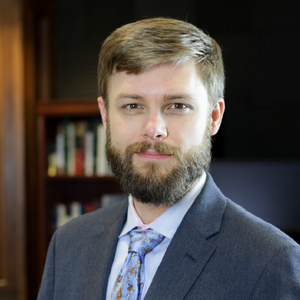Law & Principles
Trent England | November 1, 2016
The Lesser Prairie Chicken and the Constitution
Trent England
The Lesser Prairie Chicken
and the Constitution
By Trent England
What is the best way to protect the environment in Oklahoma? Is it through local partnerships, where landowners, local industries, and state or local government work together? Or should we surrender power to Washington, D.C., letting people who may have never set foot in Oklahoma tell us what to do?
This is the kind of practical question the Constitution is all about.
Even the simplest children’s game must have a set of rules. As the games get more complicated, or the stakes go up, the rules become even more important. In the old West, a disagreement about the rules of a poker game might lead to a gunfight.
The Constitution provides the rules for our national politics and union of states. It answers basic questions. How much power should politicians have? How should that power be divided up? And then where should the different powers be located—what decisions do we want made in Washington, D.C., and what should we get to decide right here?
The short answer is that Washington, D.C. is supposed to take care of things where all Americans share basically the same interests, like national security, our system of money, and trade that crosses state or national boundaries. After the Civil War, the Constitution was amended to add federal power to protect citizens’ most basic rights.
Everything else is left to the states, either to regulate, to pass down to local governments, or to keep government out of altogether. This makes sense, especially where policy choices are mostly about priorities and tradeoffs. How much should we tax and what should go to roads versus police versus schools? People have different opinions; communities have different needs. Why force a top-down solution guaranteed to make a lot of people unhappy?
This structure of states also offers a path to political compromise. If Vermont wants government-run health care, why should Oklahomans care so long as it stays in Vermont? And if Oklahoma wants lower taxes and less regulation, why should Vermonters have a say in that?
When we push our policy choices up to the federal level, we create a lot more losers. More Americans wind up unhappy and even distrustful of government altogether. When we return power to the states, we allow for more diversity. We can let Vermont be itself so long as they let Oklahoma alone, and a lot more Americans get what they want.
The recent flap over the lesser prairie chicken is a good example. Faced with declining populations of the bird, local leaders in Oklahoma, Texas, Kansas, and Colorado developed a conservation plan covering millions of acres of habitat and spending millions of dollars. It worked, and bird populations have been increasing for several years. Yet it took a lawsuit to stop Washington, D.C., from stepping in to take control anyway.
As Hillary Clinton and Donald Trump face off in November, the Constitution points the way out of at least some of the rancor. There would be no need to fight over whether the whole country needs to turn into Vermont or California or Oklahoma if we just followed our own rules—the Constitution—and left most of these decisions to be made in our states and local communities.
Trent England serves as Vice President for Strategic Initiatives at the Oklahoma Council of Public Affairs, where he also is the David and Ann Brown Distinguished Fellow for the Advancement of Liberty and directs the Center for the Constitution & Freedom and the Save Our States project. He also hosts a radio program, The Trent England Show, from 7 to 9 a.m. every weekday on Oklahoma’s AM 1640, “The Eagle.”

Trent England
David and Ann Brown Distinguished Fellow
Trent England is the David and Ann Brown Distinguished Fellow at the Oklahoma Council of Public Affairs, where he previously served as executive vice president. He is also the founder and executive director of Save Our States, which educates Americans about the importance of the Electoral College. England is a producer of the feature-length documentary “Safeguard: An Electoral College Story.” He has appeared three times on Fox & Friends and is a frequent guest on media programs from coast to coast. He is the author of Why We Must Defend the Electoral College and a contributor to The Heritage Guide to the Constitution and One Nation Under Arrest: How Crazy Laws, Rogue Prosecutors, and Activist Judges Threaten Your Liberty. His writing has also appeared in the Wall Street Journal, USA Today, Washington Times, Hillsdale College's Imprimis speech digest, and other publications. Trent formerly hosted morning drive-time radio in Oklahoma City and has filled for various radio hosts including Ben Shapiro. A former legal policy analyst at The Heritage Foundation, he holds a law degree from The George Mason University School of Law and a bachelor of arts in government from Claremont McKenna College.